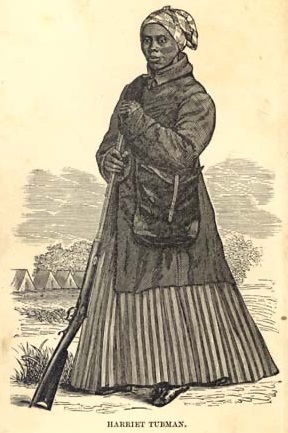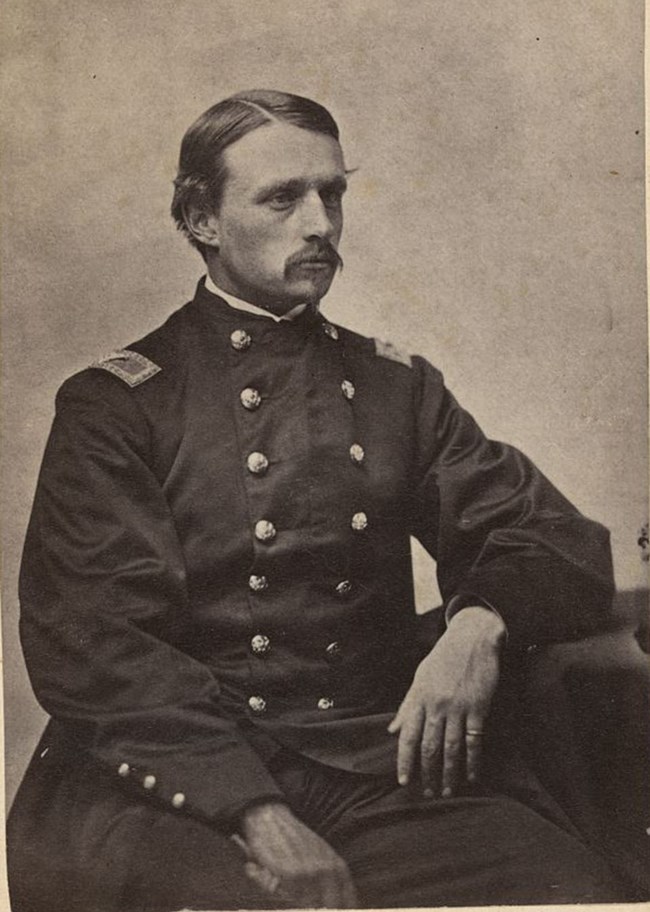Welcome to DU!
The truly grassroots left-of-center political community where regular people, not algorithms, drive the discussions and set the standards.
Join the community:
Create a free account
Support DU (and get rid of ads!):
Become a Star Member
Latest Breaking News
Editorials & Other Articles
General Discussion
The DU Lounge
All Forums
Issue Forums
Culture Forums
Alliance Forums
Region Forums
Support Forums
Help & Search
American History
Related: About this forumHarriet Tubman, 54th Mass. Reg. Civil War- Union Scout, Spy, Nurse, Cook- Shaw Last Meal, Carney MH
Last edited Fri Sep 10, 2021, 06:54 PM - Edit history (2)

- Harriet Tubman as a Civil War scout and intelligence gathering spy for the Union Army in military operations in the South Carolina area and South (1863- 1865).
_______
- Natl. Park Service, 'Harriet Tubman & the 54th Massachusetts.' Boston African American National Historic Site. - Ed.
Most Americans know Harriet Tubman as a woman who took great risks to help others emancipate themselves from enslavement. Relatively few know the entirety of her story, including her groundbreaking Civil War service. Tubman first volunteered for duty shortly after the outbreak of hostilities in 1861, offering her services to Brigadier General Benjamin Butler at Fort Monroe in Virginia. As enslaved people rushed to sanctuary at the garrison, Tubman provided humanitarian aid as a cook, laundress, and nurse.
While Tubman spent the winter of 1861-1862 in Boston, Massachusetts, Governor John A. Andrew recruited her for a new assignment, performing humanitarian work in Port Royal, South Carolina. In spring 1863, army leadership in South Carolina allowed Tubman to leave her nursing position and take on a role that aligned with her underground railroad experience. Tubman served on the front lines in South Carolina and led a scouting party of eight men. This group obtained key intelligence for the local army leadership in March of 1863, which led to US forces capturing Jacksonville, Florida.
On June 2, 1863, Harriet Tubman executed the most notable achievement of her Civil War service, the Combahee River raid. She planned this operation alongside Colonel James Montgomery, who fought pro-slavery settlers alongside John Brown in the Bleeding Kansas conflict of the 1850s. On Montgomery’s orders, Tubman led a raiding party up the Combahee River to damage the economic power of the South by burning wealthy plantations and liberating the enslaved people held there. Tubman’s talents for stealth and reconnaissance, honed during her years on the Underground Railroad, enabled the U.S. boats to avoid Confederate mines and troops. During the raid, nearly 800 enslaved men, women, and children rushed to U.S. forces—and to their freedom. The irrepressible surge to the boats represented one of the largest groups of enslaved people ever emancipated at one time.
The next day, on June 3, the 54th Mass. Infantry Regiment landed in Beaufort, So. Carolina. Col. Robert Gould Shaw, the commander of the 54th, established a different working relationship with Montgomery than Tubman had. Shaw & Tubman had different ideas of what constituted acceptable warfare, & their reactions to Montgomery’s orders reflected that difference. Whereas Tubman enthusiastically led Montgomery’s raid up the Combahee River, Shaw felt troubled when he received similar orders a week later. He & the 54th had accompanied Montgomery on his raid up the Altamaha River on June 10 & 11, 1863. Upon reaching Darien, Georgia—a small, staunchly Confederate town—Montgomery commandeered one company of the 54th Mass. and ordered them to assist him in sacking and burning the town. After the raid, Shaw wrote to his wife,
'Besides my own distaste for this barbarous sort of warfare, I am not sure that it will not harm very much the reputation of black troops and of those connected with them. For myself, I have gone through the war so far without dishonour, and I do not like to degenerate into a plunderer and robber.' Northern press coverage soon confirmed Shaw’s fears. - Read More,
https://www.nps.gov/articles/harriet-tubman-and-the-54th-massachusetts.htm
_________
- The 54th Massachusetts Regiment, National Park Service
https://www.nps.gov/articles/54th-massachusetts-regiment.htm
- The Port Royal Experiment in South Carolina- Model for Reconstruction
https://socialwelfare.library.vcu.edu/eras/civil-war-reconstruction/port-royal-experiment/
The Port Royal Experiment, the 1st major attempt by Northerners to reconstruct the Southern political & economic system, began only 7 months after the firing on Ft. Sumter. On Nov. 7, 1861 the Union Army occupied S.C.'s Sea Islands, freeing approximately 10,000 slaves. As the Confederate Army & white plantation owners fled, Northerners began to capitalize on their possession of an area world famous for its cotton. During the first year of occupation, African American field hands harvested approximately 90,000 lbs. of the crop. The workers were paid $1 for every 400 lbs. harvested- the 1st former slaves freed by Union forces to earn wages for their labor.
In Jan. 1862 Union Gen. Thomas West Sherman requested teachers from the North to train the ex-slaves. Three months later U.S. Secy. of Treasury Salmon Chase appointed Boston attorney Edward L. Pierce to begin the Port Royal Experiment to create schools & hospitals for ex-slaves & to allow them to buy & run plantations. That same month 53 missionaries were shipped to the area including skilled teachers, ministers & doctors who had volunteered to help promote this experiment...

- Col. Robert G. Shaw, the son of prominent Mass. abolitionists & commander of the 54th Mass. Reg. Shaw died on the parapet at the Battle of Fort Wagner, S.C., July 18, 1863. Stripped of his officer's sword & sash, Shaw was buried in a common grave with his men. After the war a Confederate soldier returned Shaw's belongings to his family.

- Sgt. William H. Carney, 1st African American to receive the Medal of Honor. Born enslaved in Va., settled in New Bedford, Mass. after escaping bondage via the Underground Railroad. Served with the 54th, severely injured in the assault on Wagner and saved the national colors after the color bearer fell.
"As quick as a thought," Carney said years later, "I threw away my gun, seized the colors, and made my way to the head of the column." Carney said to fellow 54th survivors: "Boys, I did but my duty; the dear old flag never touched the ground." On May 23, 1900 Pres. Theodore Roosevelt awarded Carney the Congressional Medal of Honor for his valor 37 years earlier, becoming the 1st African American to receive the honor.

- Medal of Honor belonging to Sergeant William H. Carney of the 54th Massachusetts. Awarded for his valor at the Battle of Fort Wagner. Carney was the first African American to receive the medal. More...
https://www.army.mil/article/181896/meet_sgt_william_carney_the_first_african_american_medal_of_honor_recipient
- 'GLORY' Film. 54th Arrival in Coastal So. Carolina- freed slaves, Port Royal Experiment. *Min. 4:47- Sacking, Burning of nearby DARIEN, Ga. After the war, Col. Shaw's family helped to restore the town of Darien, Georgia.
InfoView thread info, including edit history
TrashPut this thread in your Trash Can (My DU » Trash Can)
BookmarkAdd this thread to your Bookmarks (My DU » Bookmarks)
0 replies, 1303 views
ShareGet links to this post and/or share on social media
AlertAlert this post for a rule violation
PowersThere are no powers you can use on this post
EditCannot edit other people's posts
ReplyReply to this post
EditCannot edit other people's posts
Rec (10)
ReplyReply to this post